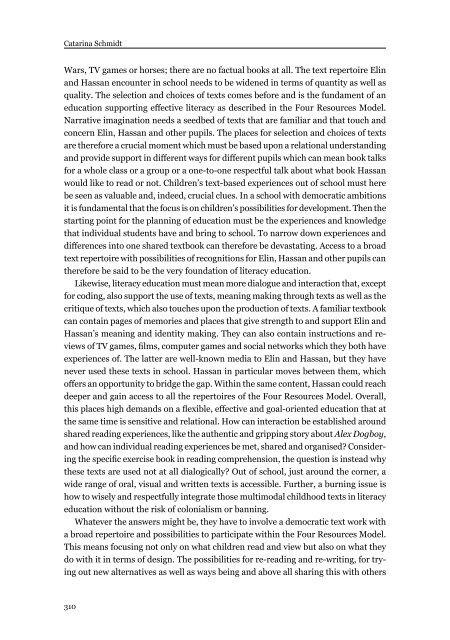Download issue - Umeå universitet
Download issue - Umeå universitet
Download issue - Umeå universitet
You also want an ePaper? Increase the reach of your titles
YUMPU automatically turns print PDFs into web optimized ePapers that Google loves.
Catarina Schmidt<br />
Wars, TV games or horses; there are no factual books at all. The text repertoire Elin<br />
and Hassan encounter in school needs to be widened in terms of quantity as well as<br />
quality. The selection and choices of texts comes before and is the fundament of an<br />
education supporting effective literacy as described in the Four Resources Model.<br />
Narrative imagination needs a seedbed of texts that are familiar and that touch and<br />
concern Elin, Hassan and other pupils. The places for selection and choices of texts<br />
are therefore a crucial moment which must be based upon a relational understanding<br />
and provide support in different ways for different pupils which can mean book talks<br />
for a whole class or a group or a one-to-one respectful talk about what book Hassan<br />
would like to read or not. Children’s text-based experiences out of school must here<br />
be seen as valuable and, indeed, crucial clues. In a school with democratic ambitions<br />
it is fundamental that the focus is on children’s possibilities for development. Then the<br />
starting point for the planning of education must be the experiences and knowledge<br />
that individual students have and bring to school. To narrow down experiences and<br />
differences into one shared textbook can therefore be devastating. Access to a broad<br />
text repertoire with possibilities of recognitions for Elin, Hassan and other pupils can<br />
therefore be said to be the very foundation of literacy education.<br />
Likewise, literacy education must mean more dialogue and interaction that, except<br />
for coding, also support the use of texts, meaning making through texts as well as the<br />
critique of texts, which also touches upon the production of texts. A familiar textbook<br />
can contain pages of memories and places that give strength to and support Elin and<br />
Hassan’s meaning and identity making. They can also contain instructions and reviews<br />
of TV games, films, computer games and social networks which they both have<br />
experiences of. The latter are well-known media to Elin and Hassan, but they have<br />
never used these texts in school. Hassan in particular moves between them, which<br />
offers an opportunity to bridge the gap. Within the same content, Hassan could reach<br />
deeper and gain access to all the repertoires of the Four Resources Model. Overall,<br />
this places high demands on a flexible, effective and goal-oriented education that at<br />
the same time is sensitive and relational. How can interaction be established around<br />
shared reading experiences, like the authentic and gripping story about Alex Dogboy,<br />
and how can individual reading experiences be met, shared and organised? Considering<br />
the specific exercise book in reading comprehension, the question is instead why<br />
these texts are used not at all dialogically? Out of school, just around the corner, a<br />
wide range of oral, visual and written texts is accessible. Further, a burning <strong>issue</strong> is<br />
how to wisely and respectfully integrate those multimodal childhood texts in literacy<br />
education without the risk of colonialism or banning.<br />
Whatever the answers might be, they have to involve a democratic text work with<br />
a broad repertoire and possibilities to participate within the Four Resources Model.<br />
This means focusing not only on what children read and view but also on what they<br />
do with it in terms of design. The possibilities for re-reading and re-writing, for trying<br />
out new alternatives as well as ways being and above all sharing this with others<br />
310

















